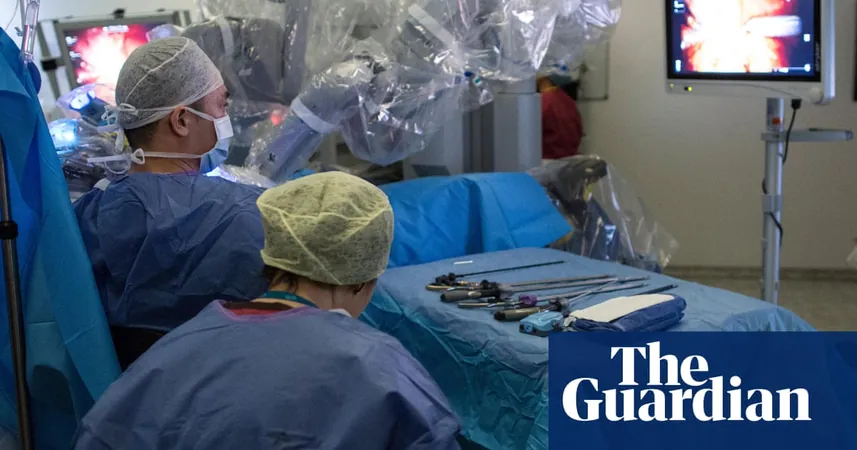
Revolutionizing Surgery: NHS Plans to Boost Robotic Procedures for Millions
2025-06-11
Author: John Tan
In a groundbreaking initiative, the NHS is set to dramatically increase the use of robotic surgery, with projections suggesting that the number of patients receiving robot-assisted procedures will skyrocket from 70,000 to an astounding 500,000 annually by 2035.
This ambitious plan aims to tackle the extensive waiting lists for hospital treatments, particularly for critical surgeries related to cancer, hysterectomies, and joint replacements.
NHS England's chief executive, Sir Jim Mackey, will reveal this strategy in an announcement that underscores the healthcare provider's commitment to reducing elective waiting times by 2029. "Utilizing innovative technology like robotic surgery is a pivotal part of our strategy to offer patients top-tier treatment," he stated.
A New Era of Surgery
By 2035, it's anticipated that 90% of keyhole surgeries, which involve small incisions, will be performed using robots—an enormous leap from just 20% today. Mackey asserts that robotic surgery will become the standard practice for many procedures.
Research indicates that robotic systems can deliver greater precision compared to human surgeons, often resulting in quicker recovery times and shorter hospital stays. Surgeons can manipulate tiny surgical instruments via a console, ensuring enhanced accuracy during operations.
Improving Efficiency and Relieving Hospital Pressures
John McGrath, who chairs the NHS’s steering group for robotic-assisted surgery, points out that this increase in robotic procedures could significantly alleviate bed shortages in overcrowded hospitals. "Faster recovery not only benefits patients directly," he noted, "but also lightens the load on healthcare services, ultimately helping to decrease waiting times for all patients."
Endorsements and Future Goals
The National Institute for Health and Care Excellence (NICE) has already endorsed the use of robotic technologies for various operations, including soft tissue surgeries like hernia repairs and orthopaedic procedures such as knee and hip replacements.
Kate Seymour from Macmillan Cancer Support expressed optimism about the plan, stating, "For many cancer patients facing long treatment delays, advancements like robotic surgery are essential for creating a faster, more effective healthcare system."
A Call for Investment
At the NHS ConfedExpo conference in Manchester, Mackey will address the future of surgical technology in the NHS. However, some health leaders, including Tim Mitchell of the Royal College of Surgeons, caution that without significant capital funding, the ambitious robotic surgery plans may falter. He emphasized that the necessary investment is crucial for ensuring all patients have access to these advanced technologies and that facilities are equipped to support them.
Health Secretary Wes Streeting, who himself benefited from robotic surgery for kidney cancer, adds a personal perspective to the discussion. "Innovative treatments are key to revitalizing our NHS and meeting future healthcare challenges," he remarked, reflecting on his own life-saving experience.
The Future Looks Bright
With plans to revolutionize surgical practices through the embrace of robotic technology, the NHS is poised to not only meet current healthcare challenges but also to enhance patient outcomes significantly. As these changes unfold, one thing is clear: the future of surgery is robotic, and it's set to pave the way for a healthier tomorrow.


 Brasil (PT)
Brasil (PT)
 Canada (EN)
Canada (EN)
 Chile (ES)
Chile (ES)
 Česko (CS)
Česko (CS)
 대한민국 (KO)
대한민국 (KO)
 España (ES)
España (ES)
 France (FR)
France (FR)
 Hong Kong (EN)
Hong Kong (EN)
 Italia (IT)
Italia (IT)
 日本 (JA)
日本 (JA)
 Magyarország (HU)
Magyarország (HU)
 Norge (NO)
Norge (NO)
 Polska (PL)
Polska (PL)
 Schweiz (DE)
Schweiz (DE)
 Singapore (EN)
Singapore (EN)
 Sverige (SV)
Sverige (SV)
 Suomi (FI)
Suomi (FI)
 Türkiye (TR)
Türkiye (TR)
 الإمارات العربية المتحدة (AR)
الإمارات العربية المتحدة (AR)